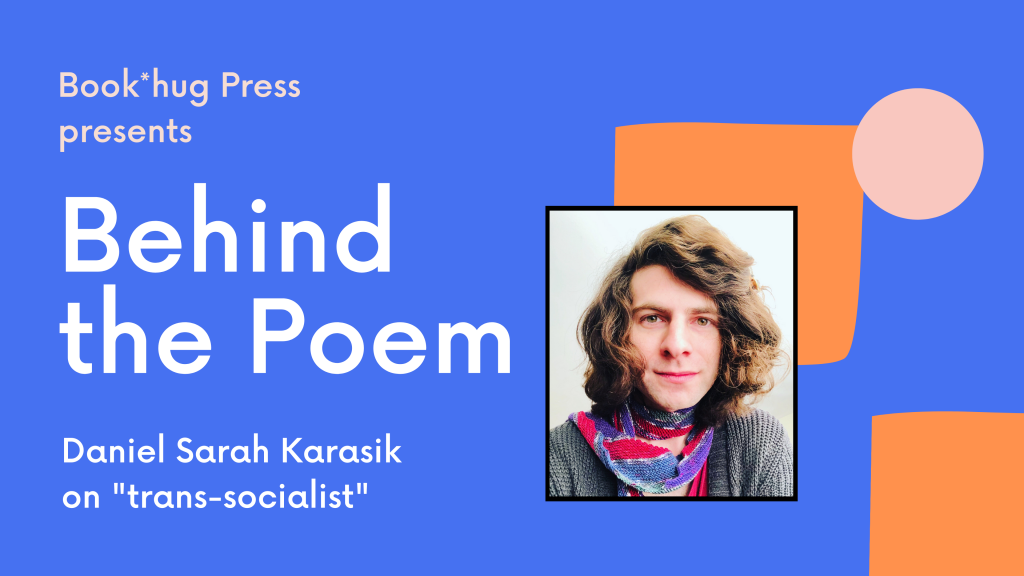Behind the Poem with Daniel Sarah Karasik

Today, Daniel Sarah Karasik takes us behind their poem “trans-socialist.” They highlight some of the ideas and politics at play, conceptualizing the poem as method rather than a booksellers’ category and revelling in binding ambiguities. Now handing it off to Karasik:
“The implicit understanding is that if you’re committed, if you’re too overtly political, then you’ve made some Faustian pact with vulgarity. Am I overstating that? I have no idea. But in reviews, novelists actually get bonus points for not having a political perspective. There’s a long history to this that I can’t summarize well here. But even today certain kinds of critics—sometimes very established—are invested in displaying their exhaustion with politically inflected art. […] I get snobbish about their snobbery. I read that sort of thing and go—oh dear. Pleasure? Profound feelings? How reductive. What a boorish, mechanical view of what art does and is for.”
That’s the critic Tobi Haslett, interviewed in the magazine The Point this month. I love that passage. The whole interview is brilliant.
“trans-socialist” is a longish poem in Plenitude that I think flows out of a spirit similar to the one Haslett expresses there. It’s a sequence of one-line stanzas (Google informs me that these are technically not stanzas but “monostichs”) spread over several pages, each attempting a partial definition of what it means or could mean to put “trans” and “socialist” together, as concepts and as practices and as language. The poem is playful and discursive, admittedly in pursuit of pleasure but not asking anyone to show up with profound feelings (though not discouraging those!). It’s politically committed in the sense that Haslett invokes: placing literary effects in the service of a side-taking political project, and maybe even willing to subordinate aesthetics to politics, while also refusing overstated oppositions between the two.
A lot of the poems in Plenitude are composed with a pretty close attention to formal elements like metre, and while that isn’t altogether untrue of “trans-socialist,” the poem clearly takes a more prosaic approach; you might not even identify it as a poem if it didn’t appear alongside more poem-y poems, like if it cropped up as an overture to a prose essay or something. But I guess I’m interested in poetry less as a booksellers’ category than as a method: a commitment to pursuing the most apt marriage between a text’s function and its form. And I think that union is kind of interesting in “trans-socialist,” a series of essayistic theses styled with just enough obliquity and intensity and playfulness on the sentence level that they add up (I hope?) to something more than the straightforward wish, demand, manifesto they might appear to be on their face. In general, I think I’m interested in how poetry can render strange—and so make new, and differently visible—the claims that a given politics may tend (often for sound tactical reasons) to boil down into slogans and other types of speech divested of ambivalence.
“trans-socialist” attempts to hold, contradictorily, the tension between the utopia of “a communism that would abolish every poem that is a poem against the police because obviously no police” and the subtly different abolitionist horizon of “no bosses no cops no shortcuts no utopia no final peace no (in the final analysis) final poem against the police.” A wish aware that it contains in itself both possibilities and impossibilities that can’t be easily disambiguated. A wish, aware. And singing through the conflict it entails and can’t resolve. I like when poems are like that.
trans-socialist
as in a public that would be safe and good for trans people.
as in what is safe and good for trans people producing a public
more adequate, more worthy of the name.*
as in a socialism whose real movement moves beyond itself.
as in communism (but why not just say that).
as in a communism that would abolish debates over when and how
to say “communism.”*
as in a communism that would abolish every poem that is a poem
against the police because obviously no police.*
as in the condition in which gender is transformed because it’s no
longer mobilized to serve institutions of social domination.as in the condition in which gender is reborn as pure play.
*
as in the state of affairs in which the state is a memory recalled only
upon consulting the archives.*
as in a warm hearth held in common but also there’s privacy.
as in erotic community but soundproofed bedrooms.
as in cocks in cute skirts as in cunts that are cocks as in t4t4t4t4t…
*
as in strife and envy and competition and violence yes sometimes ineluctably violence but outside the death cult of capital, of the wage.
as in no bosses no cops no shortcuts no utopia no final peace no (in
the final analysis) final poem against the police.*
as in beyond the last snow-capped summit, another
*
as in the prophecy that says there may be no last prophecy but this
can’t be it, keep struggling*
as in the wish that says there may be no last wish but this isn’t it,
keep going
Daniel Sarah Karasik (they/them) is the author of five previous books, including the poetry collection Hungry and the short story collection Faithful and Other Stories. Their work has been recognized with the Toronto Arts Foundation’s Emerging Artist Award, the CBC Short Story Prize, and the Canadian Jewish Playwriting Award. They organize with the network Artists for Climate & Migrant Justice and Indigenous Sovereignty (ACMJIS), among other groups, and are the founding managing editor of Midnight Sun, a magazine of socialist strategy, analysis, and culture. They live in Toronto.

